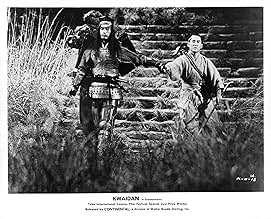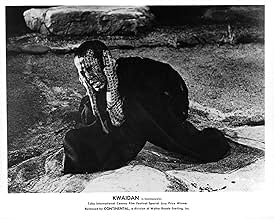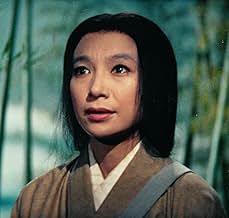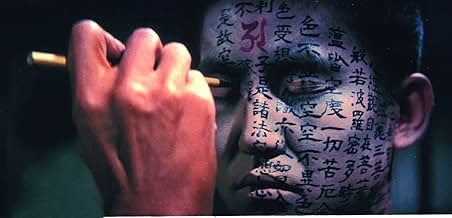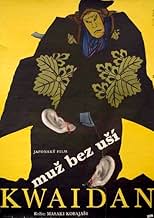VALUTAZIONE IMDb
7,9/10
20.946
LA TUA VALUTAZIONE
Una raccolta di quattro racconti popolari giapponesi con temi soprannaturali.Una raccolta di quattro racconti popolari giapponesi con temi soprannaturali.Una raccolta di quattro racconti popolari giapponesi con temi soprannaturali.
- Candidato a 1 Oscar
- 5 vittorie e 2 candidature totali
Trama
Lo sapevi?
- QuizThe four vignettes were chosen to represent the four seasons of the year.
- BlooperIn the segment "Miminashi Hôichi no hanashi", Donkai says he covered all of Hôichi's body with the sacred writing, but when Hôichi is writhing on the floor after the ghost's attack, his thighs (which in the shots were supposed to be covered by his robe) are visible for a couple of seconds and are clearly unmarked.
- Citazioni
Hoichi (segment "Miminashi Hôichi no hanashi"): As long as I live, I'll continue to play the biwa. I'll play with all my soul to mourn those thousands of spirits who burn with bitter hatred.
- Versioni alternativeOriginally a four-episode anthology released in Japan at 183 minutes. The USA version removes the second episode, starring Keiko Kishi and Tatsuya Nakadai, in order to shorten the running time to 125 minutes.
- ConnessioniEdited into Spisok korabley (2008)
Recensione in evidenza
This is one of my favorite horror films, and I daresay one of my favorite films in general as well. Anyone who doubts that a horror film can be great art as well ought to give this one a try.
I will have to revisit this comment after viewing the film again, as it has been a while, but there were a few comments I thought people might find useful regarding the stories the film adapted.
Two of the stories can be found in Lafcadio Hearn's book Kwaidan: Stories and Studies of Strange Things. These are "Hoichi the Earless" ("The Story of Mimi-nashi-Hôïchi") and "The Woman in the Snow" ("Yuki-Onna"). The other two can be found in other books of Hearn's; I'm grateful to Kenji Inadomi for pointing out that "Black Hair" can be found as "The Reconciliation" in Shadowings, and "In a Cup of Tea" is to be found in Kotto: Being Japanese Curios, with Sundry Cobwebs.
Many of Hearn's stories can be found online, including all of the above except "In a Cup of Tea." Attractive early hardcovers of Hearn's books are pretty plentiful, though, and not terribly expensive either.
As some others have noticed, there's an uncredited adaptation of "The Woman in the Snow" as the "Lover's Vow" segment of Tales from the Darkside: The Movie (1990). It's not bad, but Kaidan (1964) is the one that got it right.
I will have to revisit this comment after viewing the film again, as it has been a while, but there were a few comments I thought people might find useful regarding the stories the film adapted.
Two of the stories can be found in Lafcadio Hearn's book Kwaidan: Stories and Studies of Strange Things. These are "Hoichi the Earless" ("The Story of Mimi-nashi-Hôïchi") and "The Woman in the Snow" ("Yuki-Onna"). The other two can be found in other books of Hearn's; I'm grateful to Kenji Inadomi for pointing out that "Black Hair" can be found as "The Reconciliation" in Shadowings, and "In a Cup of Tea" is to be found in Kotto: Being Japanese Curios, with Sundry Cobwebs.
Many of Hearn's stories can be found online, including all of the above except "In a Cup of Tea." Attractive early hardcovers of Hearn's books are pretty plentiful, though, and not terribly expensive either.
As some others have noticed, there's an uncredited adaptation of "The Woman in the Snow" as the "Lover's Vow" segment of Tales from the Darkside: The Movie (1990). It's not bad, but Kaidan (1964) is the one that got it right.
I più visti
Accedi per valutare e creare un elenco di titoli salvati per ottenere consigli personalizzati
- How long is Kwaidan?Powered by Alexa
Dettagli
Botteghino
- Budget
- 350.000.000 JPY (previsto)
- Tempo di esecuzione3 ore 3 minuti
- Proporzioni
- 2.35 : 1
Contribuisci a questa pagina
Suggerisci una modifica o aggiungi i contenuti mancanti

Divario superiore
What is the Canadian French language plot outline for Kwaidan - Storie di fantasmi (1964)?
Rispondi

